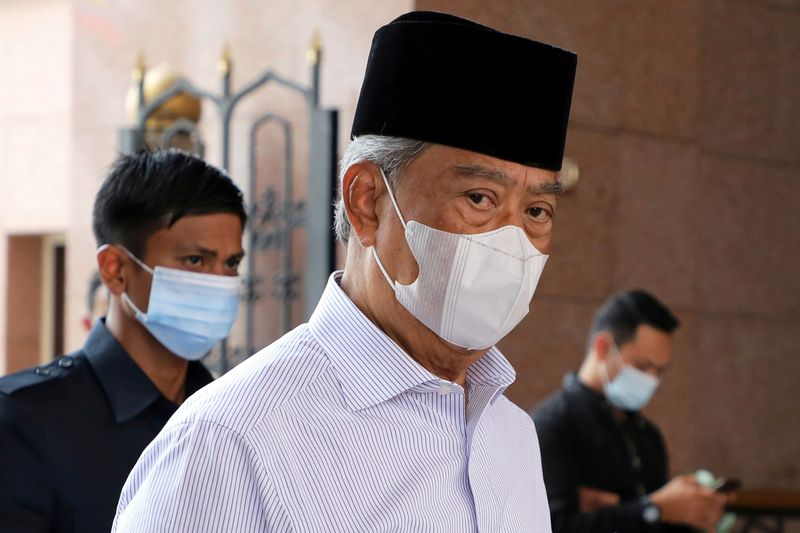Malaysia’s Muhyiddin quits as PM, agrees to caretaker role By Reuters

(Reuters) -Malaysian Prime Minister Muhyiddin Yassin resigned https://www.reuters.com/world/asia-pacific/malaysian-pm-expected-resign-after-months-political-turmoil-2021-08-16 on Monday citing a lack of parliamentary support, but agreed with the king to remain caretaker premier until a government can be formed.
Following is reaction from political and market analysts:
NIK AHMAD KAMAL NIK MAHMOD, LAW EXPERT, INTERNATIONAL ISLAMIC UNIVERSITY OF MALAYSIA
“The king will have to wait until he can find a replacement, someone who can command the majority in parliament. It might take a few days or weeks.
“If it will take more than a month then it will raise a lot of issues, especially when there is no clear-cut definition on what are the powers and limits of a caretaker prime minister.”
“All the political parties are divided. There is no one currently who could command a majority, so they are now coercing each other to support the candidate that they are putting forward.”
“The king will be waiting for people to come and see him and prove that they have a majority. The other option that he has is to call for the parliament to convene and have a vote of confidence for each of the candidates.”
TRINH NGUYEN, SENIOR ECONOMIST, NATIXIS, HONG KONG
“What happens now is we have the current PM acting as a caretaker until we have a replacement, which means the country not having a strong leader to steer it out of its current economic malaise.
“Malaysia has underwhelmed in terms of growth in the past several years…With the ongoing political crisis, it’s very difficult to see Malaysia engineer a different growth trend.”
DARREN TAY, SENIOR ASIA COUNTRY RISK ANALYST, FITCH SOLUTIONS
“While he remains as caretaker PM, investors’ attention will be focused on forming the new government. One scenario is for the Perikatan Nasional government to remain in place with a different leader, perhaps veteran lawmaker Tengku Razaleigh Hamzah or former UMNO youth chief Khairy Jamaluddin, though that will depend on the coalition staying together after months of very public infighting.
“Political uncertainty is likely to remain over the coming quarters, and slow any economic recovery.”
BRIDGET WELSH, ASIA RESEARCH INSTITUTE, UNIVERSITY OF NOTTINGHAM, MALAYSIA
“It’s difficult to predict. But now, (the king) has probably got a good sense of who the major players are, so perhaps what he might do is to meet with them. And it depends on how they can deliver the numbers…It might also give Muhyiddin a chance to regroup and get his own numbers as well.
“As he has resigned, Muhyiddin shouldn’t be in the caretaker position for a long time. Malaysia’s international reputation has been affected, so there is considerable pressure to find an acceptable leader…The sooner Malaysia gets a new, non-Muhyiddin government, the better.”
WELLIAN WIRANTO, ECONOMIST, OCBC BANK, SINGAPORE
“While there have been some market movements, including the ringgit weakening, the degree remains small and discreet. Still, at a time when COVID-19 remains prevalent and the economy has lost momentum, even if the situation is unresolved, the market would want to see at least some pathways out of the political quagmire that Malaysia has landed itself in.”
ABHAY GUPTA, EMERGING ASIA FIXED INCOME AND FX STRATEGIST, BANK OF AMERICA SECURITIES, SINGAPORE
“The two key issues for Malaysian assets are, firstly, how long it takes to resolve the crisis, and secondly, the stability of the new regime, rather than which political party comes to power.
“The overall impact would be determined by duration of the political vacuum but we believe Malaysia has well developed institutions…, which could cushion the impact on the economy if an adverse scenario materialises.”
PETER MUMFORD, EURASIA GROUP PRACTICE HEAD, SOUTHEAST AND SOUTH ASIA
“Deputy Prime Minister Ismail Sabri Yaakob is well-positioned to succeed Muhyiddin, given his number two position in government and the fact he is from the pro-Muhyiddin wing of UMNO (United Malays National Organisation), making him more palatable to Bersatu (Muhyiddin’s party).
“However, UMNO is divided over who should be the next prime
“If all UMNO and Bersatu MPs are on board, as well as the other parties…, then the ‘new’ government would have 115 MPs – a small majority, meaning political instability risks will not be dramatically reduced by Muhyiddin’s resignation.
“(Opposition leader) Anwar Ibrahim is currently less well placed to seize the crown – though this may become conceivable if UMNO and Bersatu cannot agree on a new prime minister.”
CHRISTIAN FANG, VICE PRESIDENT, SENIOR ANALYST AT MOODY’S INVESTORS SERVICE
“Although a period of political uncertainty may occur in Malaysia given the resignation of Prime Minister Muhyiddin Yassin, we expect the country’s credible and effective institutions to limit the impact on its macroeconomic policies and credit profile, as demonstrated over past episodes of abrupt political change.”

